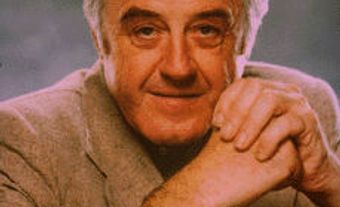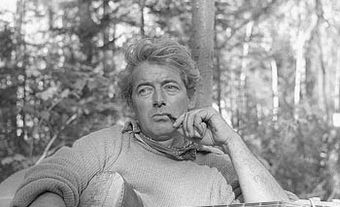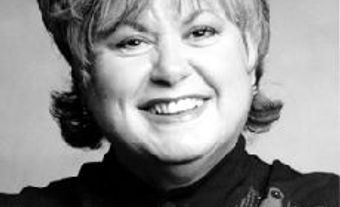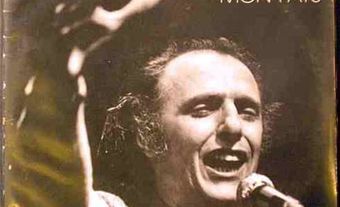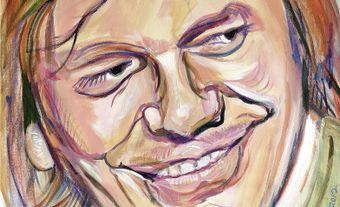Jean-Pierre Ferland, singer, songwriter, television host, actor (born 24 June 1934 in Montreal; died 27 April 2024). Jean-Pierre Ferland was recognized as one of the greatest chansonniers in Quebec and the entire French-speaking world. A romantic singer par excellence, he started with the Les Bozos in 1959. He broke out in 1962, winning first prize in a Francophonie contest with “Feuille de gui.” In 1968, he won the Grand prix de l’Académie Charles-Cros for “Je reviens chez nous.” “Un peu plus haut, un peu plus loin” became a francophone anthem and received SOCAN’s Cultural Impact Award in 2023. Ferland was made an Officer of the Order of Canada, a Chevalier of the Ordre national du Québec, an Officier of the Ordre de la Pléiade and a Compagnon of the Ordre des arts et des lettres du Québec. He and five of his signature songs were inducted into the Canadian Songwriters Hall of Fame in 2007.

Early Life and Career
Jean-Pierre Ferland graduated from Montreal’s École des Hautes Études Commerciales (now HEC Montréal) and initially worked as an accountant. He then worked as a clerk for Radio-Canada’s news service from 1954 to 1958. His colleagues encouraged him to develop his singing talent.
After leaving Radio-Canada, Ferland soon became known for his work with Les Bozos, a group of chansonniers based in Montreal. In 1959, he made his television debut as a singer on Music Hall. With Clémence Desrochers, he gave a show that ran for a year at the Anjou Theatre. The songs “Les immortelles” and “Ton visage” made him known to a wide audience in Quebec.
1960s
In 1962, Ferland’s song “Feuilles de gui” (music by Pierre Brabant) won the Radio-Canada competition Chansons sur mesure. It also won the grand prize at the Gala internationale de la chanson in Brussels. That same year, Ferland sang at the cabaret La Tête de l’art in Paris and was co-host for L’Été des Bozos, broadcast on Radio-Canada.
In 1963, he represented Canada at the third International Song Festival in Sopot, Poland, and won the prize for best singer. He starred in Jeunesse oblige on Radio-Canada, a program that introduced young Quebec chansonniers and toured Quebec in 1964. In 1965 and 1968, Ferland won the grand prize at the Festival du disque de Montréal.
In 1966, Ferland co-starred with Les Feux-Follets in a gala performance at the Place des Arts (PDA). He also toured Quebec, Ontario, Prince Edward Island, New Brunswick, and Nova Scotia. He sang for a month in Paris, where his reputation was growing. “Je reviens chez nous” announced his return to Montreal in 1968. There he was heard at the Comédie-Canadienne and at Man and His World. That year, his LP Jean-Pierre Ferland won the Grand Prix du Disque de l’Académie Charles-Cros. His career in Paris continued that year when he performed with Marie Laforêt at the Olympia and at La Tête de l’art.
During this period, Ferland also published a collection of the texts of 75 of his songs in a book entitled Chansons. In 1970, he sang at the International Exposition in Osaka, Japan.
1970s and 1980s
In 1970, Jean-Pierre Ferland released his LP Jaune. It marked a turning point in the Quebec chanson as much for its decidedly modern music as for the quality of the recording. (It was produced at André Perry’s studio.) The album sold 60,000 copies in one year. It was followed by a number of larger performances at the PDA, including one with the Montreal Symphony Orchestra. In 1974, he gained considerable success with “T’es mon amour, t’es ma maîtresse,” recorded as a duet with Ginette Reno.
Another facet of Ferland’s talent was revealed in 1976. He became writer, actor, and musician for Jacques Vallé’s film Chanson pour Julie. In the same period, he co-starred in Show des cinq grands with Claude Léveillée, Gilles Vigneault, Robert Charlebois and Yvon Deschamps in Quebec City as part of the province’s Heritage Week (Semaine du patrimoine). They also performed in Montreal for the St-Jean-Baptiste celebrations. After a Quebec tour, Ferland taped four programs for the Radio-Canada series Faut voir ca, in 1978. It was seen nationally on a CBC TV “superspecial” called Between Chopin and William Tell.
During the 1980s, without abandoning songwriting, Ferland resumed hosting TV programs with Station Soleil (Radio Québec, 1981–87), Tapis rouge (Radio-Canada, 1986), L’Autobus du showbusiness (Radio-Canada, 1987) and Ferland/Nadeau (Télé-Métropole, 1990). In 1984, he participated in the tour of the show Du gramophone au laser, a mix of the best Quebec songs of the previous 50 years. In 1989, Ferland set lyrics to Paule Baillargeon’s music for the Place des Arts opera Gala, in which he also performed. This huge production, inspired by the life of the lover and muse of Salvador Dali and Paul Éluard, performed by Sylvie Tremblay, only lasted a few days at the box office and was a financial disaster.
Later Career
Ferland made a singing comeback in 1992. In 1995, he shared the Félix Award for Songwriter of the Year with Bob Cohen and Alain Leblanc. The following year, he won Director of the Year for his show, Écoute pas ça de Jean-Pierre Ferland. In 1997, he was awarded the Prix hommage at the ADISQ Gala for his lifetime achievements.
At the turn of the century, Ferland’s career was still at full steam. Between 2005 and 2007, he undertook his last Quebec tour with his Trois fois Ferland show, which covered the three periods of his 35-year career. Divided into three sections, the show opened with Ton visage (1960s) before moving on to Jaune (1970s) and Écoute pas ça (1980s through the present).
Ferland performed a farewell show on 30 January 2007 at the Bell Centre in Montreal. In 2010, his album Bijoux de famille / Duos Ferland was named Pop Album of the Year at the Félix Awards.
Notable Works
A romantic singer par excellence, Jean-Pierre Ferland released over 30 albums and composed more than 450 songs. Notable among his greatest hits are “Les Immortelles,” “Fleurs de macadam,” “Ton visage,” “Rue Sanguinet,” “Avant de m’assagir,” “Le Petit roi,” “Ste-Adèle P.Q.,” “Un peu plus haut, un peu plus loin,” “Marie-Claire,” “Quand on aime on a toujours 20 ans,” “Androgyne,” “T’es mon amour, t’es ma maîtresse,” and “Je reviens chez nous.”
Besides those cited above, the songs “Un peu plus loin,” “Le petit roi” and “T’es belle” boast a production quality that ranks Ferland among the greatest 20th-century francophone songwriters. Ferland’s 1970 album Jaune is considered a significant landmark in the history of the Quebec chanson.
Ferland always chose the best performers for his songs — usually women. In 1978, Claude Lacombe wrote in Ici Radio Canada that Ferland’s songs “talk of love and women but also memories, anguish, hopes and dreams, always with the familiar irresistible warmth. He surrenders himself to his audience in a musical show of great quality, charged with emotions that range from tender to tempestuous.”
Honours
Jean-Pierre Ferland received many honours throughout his prolific career. He has been celebrated as one of the greatest singer-songwriters in Quebec and the entire French-speaking world. He was made an Officer of the Order of Canada in 1996 and a Chevalier of the Ordre national du Québec in 2003. In 2007, he was inducted into the Canadian Songwriters Hall of Fame, as were five of his signature songs: “Je reviens chez nous,” “Le petit roi,” “T’es mon amour, t’es ma maîtresse,” “Ton visage” and the francophone anthem “Un peu plus haut, un peu plus loin.” The latter also earned Ferland SOCAN’s Cultural Impact Award in 2023.
Ferland was made a Chevalier of the Ordre de la Pléiade in 2006 and was promoted to Officier in 2010. He received the Medal of Honour from Quebec’s National Assembly in 2009 and was made a Compagnon of the Ordre des arts et des lettres du Québec in 2016.
Awards
Félix Awards
- Songwriter of the Year (shared with Bob Cohen and Alain Leblanc) (1995)
- Director of the Year (Écoute pas ça) (1996)
- Prix hommage (1997)
- Pop Album of the Year (Bijoux de famille / Duos Ferland) (2010)
SOCAN Awards
- Classic Award (“Je reviens chez-nous”) (1993)
- Classic Award (“T'es mon amour t'es ma maîtresse”) (1994)
- Classic Award (“Quand on aime on a toujours vingt ans”) (1994)
- Classic Award (“Le petit roi”) (1995)
- Classic Award (“Un peu plus haut un peu plus loin”) (1998)
- Classic Award (“Marie-Claire”) (1998)
- National Achievement Award (1999)
- Classic Award (“Qu'est-ce que ca peut ben faire”) (2003)
- Classic Award (“Ma chambre”) (2004)
- Classic Award (“Y'a pas deux chansons pareilles”) (2004)
- Pop/Rock Music Award (“Le petit roi”) (2005)
- Classic Award (“Ton visage”) (2006)
- Classic Award (“T'es belle”) (2010)
- Classic Award (“Ste-Adèle P.Q.”) (2010)
- Slaight Family Polaris Heritage Music Prize (Jaune) (2019)
- Cultural Impact Award (“Un peu plus haut, un peu plus loin”) (2023)
Others
- International Song Competition (“Feuilles de gui”), CBC/Radio-Canada (1962)
- Grand Prize (“Feuilles de gui”), Gala internationale de la chanson in Brussels (1962)
- Best Singer, International Song Festival (1963)
- Prix Rolande-Desormeaux, Gala des artistes (1964)
- Best Singer-Songwriter, Festival du disque de Montréal (1965, 1968)
- Grand Prix, Académie Charles-Cros (1968, 1975)
- Prix de l'Union des artistes (1992)
- Médaille Jacques-Blanchet (1995)
- Officer, Order of Canada (1996)
- Best French-Language Song, Prix Miroir (2000)
- Chevalier, Ordre national du Québec (2003)
- Most Popular Show, Prix Miroir (2004)
- Prix homage, Prix Miroir (2006)
- Chevalier, Ordre de la Pléiade (2006)
- Inductee, Canadian Songwriters Hall of Fame (2007)
- Medal of Honour, National Assembly (2009)
- Officier, Ordre de la Pléiade (2010)
- Compagnon, Ordre des arts et des lettres du Québec (2016)
A version of this article was previously published in the Encyclopedia of Music in Canada.

 Share on Facebook
Share on Facebook Share on X
Share on X Share by Email
Share by Email Share on Google Classroom
Share on Google Classroom

